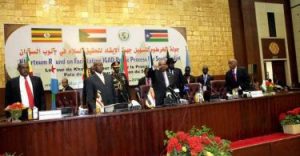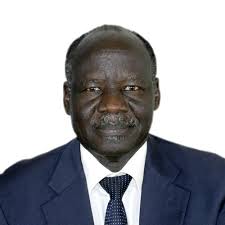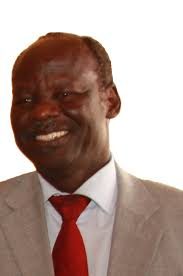Southern Sudan: The opposition coalition and the group of detainees require that their comments be included to sign peace.

Khartoum, August 4, 2018 – The opposition coalition and the group of former detainees in southern Sudan have signed the peace agreement by including their comments in the agreement supervised by Khartoum under the auspices of IGAD.
The opposition alliance and the group of former detainees said in a joint statement on Friday that they would not sign a power-sharing agreement on Sunday for Juba’s rejection of remarks made by both sides.
According to the statement, the two sides met with the main mediator, the Sudanese foreign minister, last Sunday, and presented him issues for further negotiation to sign the agreement on issues of governance next Sunday.
“The mediator promised to look at these points. On 2 August – the Minister informed us that he had consulted with the parties and that Juba refused to take our concerns into consideration, so there was nothing he could do. ”
“In the light of this development, we would like to inform our people that we can not sign the agreement in its current form, yet we are ready to sign if and when our concerns are addressed by the mediators as mentioned above.”
In an attempt to save the situation, Sudanese Foreign Minister Dardari Mohammed Ahmed arrived Friday in Juba, where he met with South Sudan’s President Salva Kiir Mayardit in an attempt to bring the opposition and opposition factions closer together.
According to the Sudan News Agency, Dardiri told her that he handed Kiir a letter from President Omar al-Bashir related to his invitation to attend the signing ceremony of the peace agreement in Khartoum on Sunday.
Dardiri said he presented to Salva Kiir Tanweira on his recent African tour and the topics he had discussed with African heads of state and leaders interested in the South, who are expected to take part in the signing ceremony.
In particular, he referred to the Rwandan President, African Union President Paul Kagame and Kenyan President Ohoro Kenita, who will take charge of the negotiations after Sudan.
“I have conveyed to Salva Kiir what we expect from special procedures and arrangements and what remains of the CPA and how to complete them,” he said.
According to the opposition alliance and the group of former detainees, they remained in constant consultation with mediation, focusing on Article 4 (Number and Limits of States), Sub-Articles 6.7 and 6.8 (National Committee for the Pre-Transition Phase and its Fund), and Article 5.1 (Sharing of State and Local Government Responsibilities) , Noting that they presented several options in these three issues.
It explained that article 4 related to the composition of the Independent Border Commission, the decision-making within it and the reference in case the Commission failed to reach a final decision.
They suggested that the reference should be the adoption of the decision taken by the Ministerial Council to be inaugurated at the fifty-fifth session on 31 January 2016 or the 79 provinces bordered on 9 July 2005 or the three regions, or as a last resort, arbitration.
In the same context, the media official in the office of the leader of the main rebel movement Riek Machar told Sudan Tribune that there was still a dispute in the ruling file, which concerns power-sharing in the states.
He explained that the mediation changed these percentages by 70% for the government and 30% for the opposition, which led the factions to claim 49% and 51% of the government.
Sudan’s mediation has re-established power-sharing in state governments by 55 percent for the government and 45 percent for the opposition, Booth said.
“We have agreed to this division for peace and we await the approval of the government,” he said, expecting Dardairi’s visit to Juba and before him the defense minister and director of the security and intelligence apparatus to try to convince President Kiir of the mediation proposal on the division of power in the states.
The spokesman for the movement of Machar on the readiness of the movement for the final signing on Sunday, indicating that, upon signing, Khartoum has succeeded in entrusting the IGAD body of security arrangements and the division of power, to move the talks to Nairobi to discuss the time matrix for implementation and issues related to economic and judicial reforms and others .
For his part, the Secretary General of the National Authority for the support of peace and a member of the delegation of negotiations in southern Sudan, Stephen Lallal that the Southern Opposition Alliance is ready to sign if the inclusion of his remarks, “mission and immunity” in the agreement.
He pointed out that the position of the opposition coalition focuses on the formation of a mini-government does not include this huge number of 550 deputies of parliament and 32 states, 35 ministers and 10 deputy ministers. He added “these observations in order to fortify and strengthen the agreement so as not to repeat the events of 2016.”
“This is a giant government that does not serve the transitional government and the question is where the budget will come from,” he said. “South Sudan needs any fils for development and services.”
“I do not think the coalition forces are seeking power, they want to reverse the true face of the southern people’s claims. There are legitimate demands of the importance of consolidating the principle of transitional justice and addressing crises of social rift. ”
He said that the coalition has made observations to the UN Security Council on the implementation of the agreement in the current form and appealed to the United Nations and the European Union to play a pivotal role to address the differences facing the parties and contribute to support this agreement.
Khartoum arranged for a huge signing ceremony called by IGAD leaders and diplomatic missions in Khartoum. The foreign minister ended a quick tour Wednesday, including Rwanda and Kenya, to inform their leaders of the development of the South Sudan peace process and invited them to attend the final signing ceremony on Sunday.















